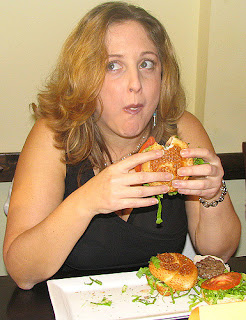Food dependence: how to identify and fight
Sunday, April 09, 2017
Add Comment
Food dependence is along with such vices as dependence on alcohol, smoking or drugs. It causes many diseases and can lead to irreversible consequences. Find out how to help a person suffering from food addiction.
Food dependence is a problem that it is very difficult for a person to cope alone. "So what? Just do not eat, "many will say without thinking.
The pleasure that people receive from the process of eating their favorite dishes is seen by many as a way of solving psychological problems. People "seize" stress, while constantly suffering from a feeling of "emptiness" inside. It is perceived by the body as a feeling of hunger, and the only way to combat this emptiness is food.
All that is nutrition is described and how to deal with it, nutritionist Alla Tsvetkova said in her blog .
Symptoms of food dependence
The main causes of food dependence
Who is at the "risk group"?
Signs of food dependence:
How to get rid of food addiction:
Coping with food dependence alone is difficult enough, but the advice of nutritionists and psychologists will help you escape from the captivity of food. The main thing is to recognize that you have this dependence, and really want to fight it.
Source:
www.ivona.bigmir.net
Food dependence is a problem that it is very difficult for a person to cope alone. "So what? Just do not eat, "many will say without thinking.
The pleasure that people receive from the process of eating their favorite dishes is seen by many as a way of solving psychological problems. People "seize" stress, while constantly suffering from a feeling of "emptiness" inside. It is perceived by the body as a feeling of hunger, and the only way to combat this emptiness is food.
All that is nutrition is described and how to deal with it, nutritionist Alla Tsvetkova said in her blog .
Symptoms of food dependence
- You eat more than a year or half a year ago, while preferring semi-finished products and instant food.
- You need more food to cope with stress or other conditions. You notice that you eat much more food than other people.
- You feel anxiety when there is a feeling of hunger.
- Your thoughts are busy planning breakfast, lunch and dinner so that all other problems go to the background.
- Constant diets and attempts to solve the problem of excess weight independently, which do not yield any results (or short-term result).
- You continue to follow your eating habits, not paying attention to the consequences (deteriorating health, weight gain).
The main causes of food dependence
- Absence of the purpose and meaning of life. It's much easier to seize emptiness and boredom than to look for its causes. The solution of the problem is the help of a psychologist, a psychotherapist, group therapy.
- The state of loss or disappointment, when a person begins to eat, to fill the resulting lack of "happiness." The solution of the problem is the control of a nutritionist.
- Various crisis conditions: the threat of dismissal or divorce, the struggle for the love of a partner or parents. The solution of the problem is the help of a psychologist.
Who is at the "risk group"?
- Very often, food addiction affects children from difficult families with despotic, cold, inattentive and unloving parents.
- Children who have a ban on expressing emotions, especially negative ones, also fall into the risk group.
- Food dependence is also affected by what kind of relationship a person has with his mother. If the mother feeds the child against his will or manipulates the food as a reward or punishment, then in the future his eating habits may be distorted, which often leads to overeating.
- Women suffer from food dependence more often than men.
Signs of food dependence:
- Constant thoughts about food;
- Impulsive eating behavior - passing by, a person will necessarily eat left on the table;
- Problems with self-control in relation to food - a person can not resist and eat everything, instead of one or two pieces;
- We console ourselves with "tasty" in a difficult situation;
- If there is no favorite food, there comes a state close to "breaking" - irritability, unpleasant sensations at the physical level);
- The desire is in solitude;
- Does not honestly admit, neither to himself, nor to others, how much and what he ate today actually;
- Experiences guilt after eating;
- Reluctance to share your favorite food.
How to get rid of food addiction:
- Balanced diet, composed by a dietician, taking into account all the necessary conditions of your life and physiological characteristics.
- Remove all products that will interfere with the food plan.
- Start eating regularly, do not skip meals, control the size of the portion.
- Communicate with people who suffer from the same problem. This provides real help in the fight against dependence.
- Get a food diary and write down everything you eat in a day. Even small meals should be reflected there.
- Start to consciously control stress. Use exercises for relaxation, meditation, music and physical activity.
Coping with food dependence alone is difficult enough, but the advice of nutritionists and psychologists will help you escape from the captivity of food. The main thing is to recognize that you have this dependence, and really want to fight it.
Source:
www.ivona.bigmir.net


0 Response to "Food dependence: how to identify and fight"
Post a Comment